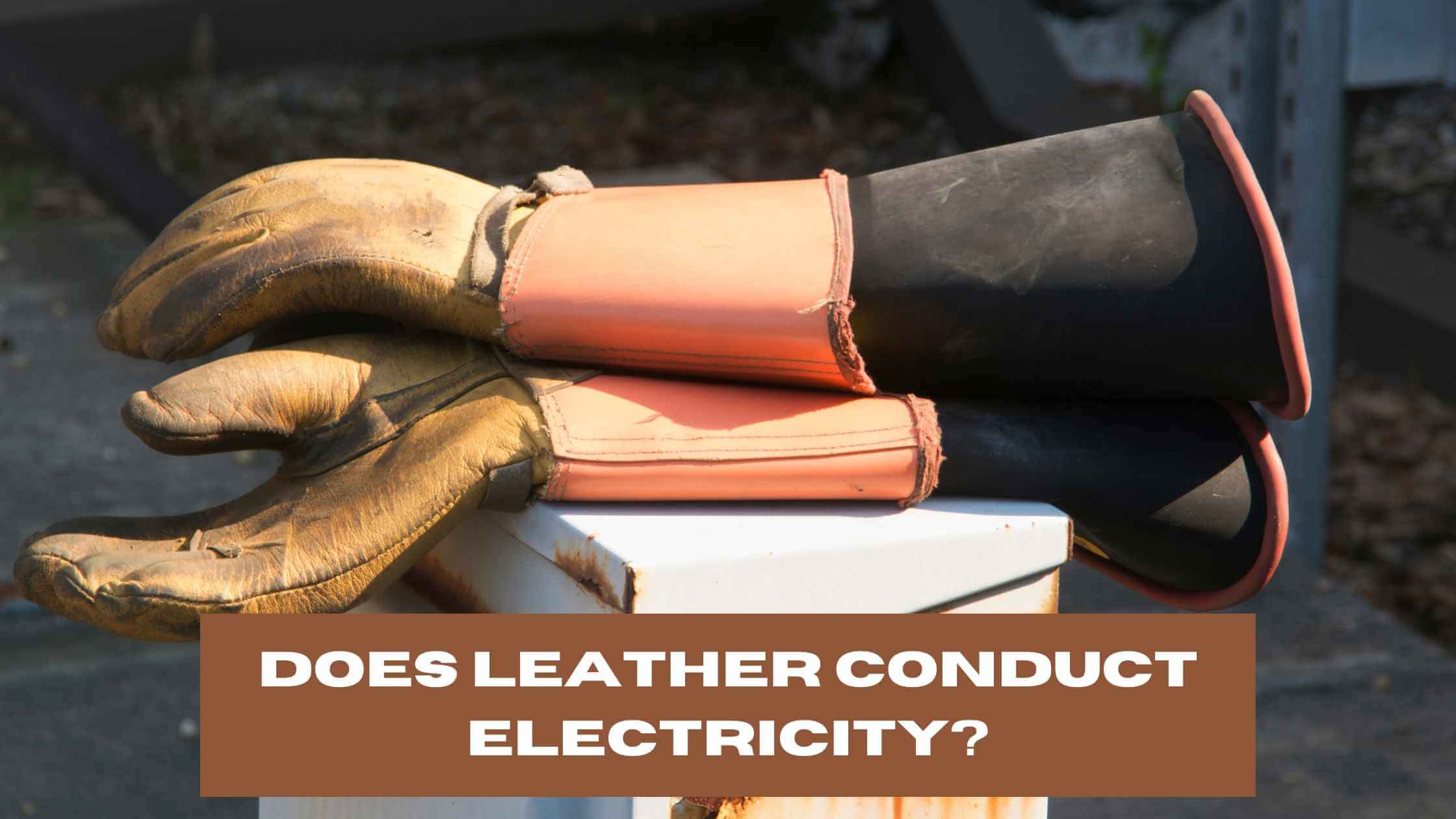Whether it’s a tiny shock or a larger one from a build-up of static electricity, it’s good to know if leather conducts electricity or not and what’s its role!! Take a look.
No, leather doesn’t conduct electricity like wool or cotton products, though it’s not immune. You can conduct some electricity through leather if it’s new and has a moisture content in its fibers. This moisture content will promote conductivity easier and better than older and more dried-out leather products. While leather is technically capable of being a conductor of electricity, it’s better known as an insulator!
Is leather electrically conductive?
There’s some debate over whether or not leather is considered a conductor or an insulator. As you learned above, leather can technically be a conductor if it’s new and has a natural moisture content in it. So this technically means it can be conductive.
We say “technically” because electricians are notorious for wearing some form of leather gloves while on the job. Since they are experts in electricity and safety, they’ll be quick to tell us that leather gloves’ potential for conductivity is so low it’s negligible!
Is leather a good insulator?
So, with that said, you’ll find most people supporting leather as a good insulator. This refers to insulation from a potential for electric shock, heat, and other kinds of potential damage.
According to Statista, leather is the preferred material for thermal gear, which can be safety gear and classic winter or cold weather gear! It protects the hand from cold temperatures and the skin from scratches and harm.
What makes leather a reliable insulator?
Need clarification about why leather can be a conductor but also an insulator? Let’s take a detailed look at what makes it such a reliable insulator. It comes down to 3 different focus points:
- Tensile strength
- Flexibility
- Insulation value
The tensile strength of leather is the physical strength of leather’s texture. As you know, leather is made from animal skin. It has a reliable strength that keeps sparks and shocks on one side and your sensitive skin on the other side. While some things can damage leather’s natural strength, we can all love leather specifically for its strength!
For the best tensile strength, choose leather with high-fat content. Low-fat content leather is going to be brittle and weaker. The fat is what keeps the tensile strength high.
The next feature of why leather is such a reliable insulator is the flex in its fibers. The flex gives it its flexibility, of course, but also how the glove fibers move. This works best with an example: If an electrical charge were to hit the leather glove, the flex would physically transfer it from one cell to the next and so on until it passed out of the glove entirely. It’s sort of like a built-in forcefield!
The last detail is the actual insulation factor. Since they’re powerful insulators from physical cuts or damage to the skin, etc., they’re also powerful insulators for electricity and sparks. They insulate your skin from the snap of a minor electrical shock (more on that next), just like they’d protect you from a snap of cold or heat!
Do leather gloves protect you from electric shock?
You can probably guess the answer to this, but: yes! Leather gloves can and do protect you from a minor electric shock. For example, a spark from an outlet or static electricity. While the goal would be never to need that protection, the potential for it is why protective gloves exist!
According to Statista, most electrical injuries are caused by touching live conductors. While leather gloves will do well, you shouldn’t ever rely on them to protect against a major shock, such as what’s possible by touching a live conductor. There is only so much that even the best protective gear can do.
How much does leather block electricity?
As far as classification is concerned, leather gloves are for Class 2 protection. They can protect you from anything under 17,000V. For reference, Creative Safety Supply explains that you can die from shocks above 2, 700V. However, many factors go into that, including the difference between a one-time shock to an ongoing shock.
While leather will help insulate you from direct shocks, it’s only part of safety on the job when working with electrical current.
Are leather gloves good for electrical work?
Yes, leather gloves are some of the most popular options you can seek out specifically for electrical work and protection! While leather gloves are good in and of themselves, you’ll want to consider professional leather gloves with a lining inside made of rubber. Since rubber is an excellent insulator, it helps further protect you from any accidental shocks!
What type of leather gloves can I use for electrical work?
Classic, lightweight leather gloves are okay for use with lightweight electrical work and handling electrical tools. However, you’ll want to consider gloves with insulating liners if you are doing anything heavier than that. The best liners include:
- Rubber
- PVC
- Ceramic
- Plastic
- Glass
I know what you’re thinking: how could we possibly have a glass or ceramic set of gloves?
Nowadays, synthetic liners created with these materials can offer reliable protection without restricting your dexterity (aka comfort in movement).
Is synthetic leather conductive?
Synthetic leather also called “fake leather,” is made from polymers rather than animal skin. Since no animal skin is involved, it loses all of its benefits as far as classic leather.
When it comes to conductivity, it seems to depend on what kind of polymers are used in your synthetic leather gloves. While synthetic leather gloves aren’t supposed to be conductive, they can be. You should consider the conductivity risk higher in synthetic leather gloves than in authentic leather gloves.
Is leather anti-static?
Leather is excellent for protection against static (and sparks). That’s why Kidadl explains that you should wear leather during winter to help protect yourself against those surprisingly painful static shocks!
Top safety tips for leather gloves and electricity
If you want to keep yourself safe from static shocks, sparks, and low-voltage electric shock with leather gloves, there are a few focus points that can help you out. These are:
- Never use fashion gloves for electrical work
- Consider insulating liners for electrical work
- Make sure you purchase authentic leather rather than synthetic leather
- Check your gloves over for cracks and holes before use
Never use fashion gloves for electrical work
Fashion gloves (such as those sold in stores for winter wear) can technically protect you against electric shock. Still, it would be best if you never used those instead of actual leather gloves for working around the house.
Consider insulating liners for electrical work
If you’re using your leather gloves for electrical work, you’ll want to strongly consider insulating liners, as discussed above. After all, you can never have too much protection when it comes to electrical work.
Make sure you purchase authentic leather rather than synthetic leather
Authentic leather has the best potential for insulating values rather than synthetic leather. For work gloves, go with genuine leather (and double-check the tag to ensure that you’re buying what you think you are since many can blend both together).
Check your gloves over for cracks and holes before use
Any potential “weak point” in your leather gloves can cause an electrical shock to slip through directly to your skin.
Before starting any electrical work, check your cloves over carefully for cracks, holes, or areas where the thread has given way. If you notice any of these, you’ll want to use those for classic “outside work” rather than electrical work in the future.
After all, your protection is only as strong as its weakest link. When it comes to electrical work, you don’t want any weak links!
While leather is technically capable of conducting electricity if it is wet, has a natural moisture content in it from being brand new, or it’s synthetic as opposed to genuine leather. You’ll still find that most electrical safety experts consider leather more likely to be an insulator rather than a conductor.
Classic leather gloves for work gloves will offer you excellent, reliable protection against static, sparks, and minor electrical shocks!
Know someone who is searching for the right protective gloves? Please share this with them to help keep them safe!

